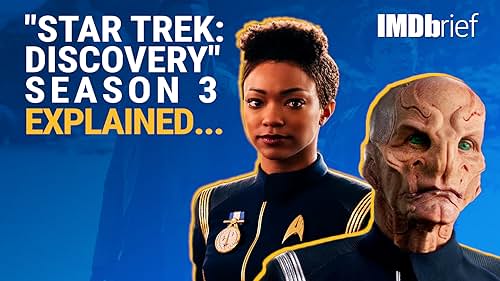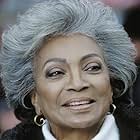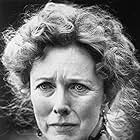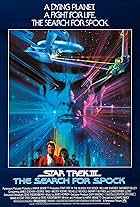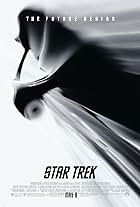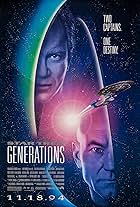In the 23rd Century, Captain James T. Kirk and the crew of the U.S.S. Enterprise explore the galaxy and defend the United Federation of Planets.In the 23rd Century, Captain James T. Kirk and the crew of the U.S.S. Enterprise explore the galaxy and defend the United Federation of Planets.In the 23rd Century, Captain James T. Kirk and the crew of the U.S.S. Enterprise explore the galaxy and defend the United Federation of Planets.
- Won 1 Primetime Emmy
- 16 wins & 32 nominations total
Browse episodes
Featured reviews
Does anyone need an introduction anymore to this great series? In the beginning Desilu said yes to the budget and schedule of Roddenberry only because there were many space stories being pitched and picked up in the mid-sixties, and this was going to be theirs. NBC used Star Trek to compete with Lost in Space, which was already on CBS the year before.
NBC being the all color network made the series very high key in lighting and primary-colored in the uniforms and the instrument displays, to better sell color TV at the time.
There were so many innovations shown on the screen from Dr.McCoy's diagnostic helpers to the auto door movements to hand communicators, transporters, phased light weapons, all of which impressed viewers. Added to that, they all seemed like they really worked!
People have said that Star Trek was the first to show an alien working harmoniously on a space crew and this is not fully true. You might laugh now, but in 1950 there was a very popular, well written, well acted radio and TV series called "Tom Corbett, Space Cadet" that had that very element working for it. Nothing much was very ground breaking on that show except that the acting was a cut above other shows. Roddenberry did go a few steps farther with Star Trek, adding a multi-racial crew and women having real authority as crew members or aliens.
Prior to Star Trek, the "alien" or "other" was a concept meant to inspire fear and justify violence. However it seemed that the series delighted in reversing this. Repeatedly the aliens are shown to be less dangerous than thought: the Talosians want the best for Capt. Pike, Balok isn't so bad, the Salt Creature is meant to be pitied, and so on. However if the villain was inanimate or a Frankenstein composed of man's ignorance, say NOMAD or the Planet Killer, then all violence the Federation can muster could be justified.
For my money Roddenberry, who appeared to be a casting couch throwback producer from an "Ed Wood" era, accomplished nothing so amazingly wonderful prior to Star Trek, and certainly nothing afterward that ever surpassed this singular achievement. He fought to keep Mr. Spock in the show and oversaw all the writing for a stable consistency,(I'm not a Harlan Ellison fan), so from this perspective, you could say he was born to create Star Trek then step off the stage. His whole life after Trek seemed warped by the show's gravity, and often he was pulled back into it for the 1987 follow on series and the first round of feature films.
Some audience members may prefer TNG, or the feature films. They may look back at the 1966 debut of Star Trek as merely "the future looked a lot like the Sixties". But why is it that the pure human emotions in those 79 episodes still attracts new converts? There must be something there that's communicating beyond the show's original five year mission. Star Trek still works as an adventure; one that considers human drama primary. That is unusual for any science fiction based story, wouldn't you say?
NBC being the all color network made the series very high key in lighting and primary-colored in the uniforms and the instrument displays, to better sell color TV at the time.
There were so many innovations shown on the screen from Dr.McCoy's diagnostic helpers to the auto door movements to hand communicators, transporters, phased light weapons, all of which impressed viewers. Added to that, they all seemed like they really worked!
People have said that Star Trek was the first to show an alien working harmoniously on a space crew and this is not fully true. You might laugh now, but in 1950 there was a very popular, well written, well acted radio and TV series called "Tom Corbett, Space Cadet" that had that very element working for it. Nothing much was very ground breaking on that show except that the acting was a cut above other shows. Roddenberry did go a few steps farther with Star Trek, adding a multi-racial crew and women having real authority as crew members or aliens.
Prior to Star Trek, the "alien" or "other" was a concept meant to inspire fear and justify violence. However it seemed that the series delighted in reversing this. Repeatedly the aliens are shown to be less dangerous than thought: the Talosians want the best for Capt. Pike, Balok isn't so bad, the Salt Creature is meant to be pitied, and so on. However if the villain was inanimate or a Frankenstein composed of man's ignorance, say NOMAD or the Planet Killer, then all violence the Federation can muster could be justified.
For my money Roddenberry, who appeared to be a casting couch throwback producer from an "Ed Wood" era, accomplished nothing so amazingly wonderful prior to Star Trek, and certainly nothing afterward that ever surpassed this singular achievement. He fought to keep Mr. Spock in the show and oversaw all the writing for a stable consistency,(I'm not a Harlan Ellison fan), so from this perspective, you could say he was born to create Star Trek then step off the stage. His whole life after Trek seemed warped by the show's gravity, and often he was pulled back into it for the 1987 follow on series and the first round of feature films.
Some audience members may prefer TNG, or the feature films. They may look back at the 1966 debut of Star Trek as merely "the future looked a lot like the Sixties". But why is it that the pure human emotions in those 79 episodes still attracts new converts? There must be something there that's communicating beyond the show's original five year mission. Star Trek still works as an adventure; one that considers human drama primary. That is unusual for any science fiction based story, wouldn't you say?
This show changed the way we looked at science fiction forever. Before there was The Next Generation, Deep Space Nine, Voyager, and the prequel Enterprise. There was Captain James T. Kirk and crew on the Starship Enterprise. Exploring new worlds and new life. Traveling through time and space. Leonard Nimoy is great has Mr. Spock, the half human/half alien science officer and second in command. Deforest Kelly is also great Has Dr. Leonard Bones Mccoy, our favorite whiney Doctor, who came out with favorite sayings like "He's dead Jim" and "I'm a Doctor not a brick layer". The special effects may have seemed hoaky at times. But the show was still great in it's day. Gene Roddenberry was a genuis when he created this show. The show was well acted by everyone . So Star Trek fans live long and prosper.
10macbug
One must remember that Star Trek was made as a for profit network TV. The amount of money and total lack of any computer aided special effects. Was the norm, it a call for innovation, creativity, thinking outside the box, in fact they did not even have a box. So remember 10 years before Star Wars, Ten years before the the first Apple Computer, during the Civil Rights movement, during the peak of the Viet Nam War, Before man had set foot on the surface of the moon, a man name Roddenberry had a vision to " Go where no man went before". Exploring social issues, with appearances by some of the days leading actors, and actresses. Star Trek in a way is a time warp of the mid 1960's. The styles and culture are mixed in series. Indian mysticism, invaded the series just like the white album. I believe the most diverse cast and characters in the history of TV. The one high tech aspect of the show is and was it was filmed in color when few people owned color TV's. Live long and prosper.
This has to be one of the greatest series in history. I really enjoy watching a lot of the episodes especially those from the second and third seasons when Chekov was on and the supporting cast really became complete. I especially loved the episodes that dealt with what happens when someone upsets the natural course that a planet goes on (eg. "A Piece of the Action"). In the case of those episodes, usually someone wants to help a planet achieve its destiny at a faster rate or leaves a form of literature or technology behind leading to disastrous results as was the case with the Ekosians who followed the Nazi model or the world that used the model of 1920's Chicago to base their societies on. This pretty much is a moral for any world including our own and how we should leave not only people follow their own path but let nature take it's own path.
I am 58 and never was a big fan of science fiction. Had seen episodes from Star Trek decades ago, but never was a huge fan.
Well...recently have been watching reruns on a free TV channel. And I am amazed at how good and unique this show was....and is...especially for a show from the 1960s. Much credit is due to William Shatner. He's a good, versatile actor and was able to "sell" the script with a sense of seriousness and reality that it made up for the low budget sets, costumes and sometimes silly plots. He should have won an emmy for his acting.
Also, loved the vibrant simple colors used on the sets and in wardrobe. The thinly adorned sets were visually enhanced by all these primary colors.
The topics, scientific lingo and gadgets were also far beyond what most people were thinking of before this period. Look at all those cell phones they used in the series. And the flat screen TV monitors. Just way ahead of their time.
Of course, Spock and the doc were great supporting cast members. But without Kirk, William Shatner, the show probably would not have worked.
Well...recently have been watching reruns on a free TV channel. And I am amazed at how good and unique this show was....and is...especially for a show from the 1960s. Much credit is due to William Shatner. He's a good, versatile actor and was able to "sell" the script with a sense of seriousness and reality that it made up for the low budget sets, costumes and sometimes silly plots. He should have won an emmy for his acting.
Also, loved the vibrant simple colors used on the sets and in wardrobe. The thinly adorned sets were visually enhanced by all these primary colors.
The topics, scientific lingo and gadgets were also far beyond what most people were thinking of before this period. Look at all those cell phones they used in the series. And the flat screen TV monitors. Just way ahead of their time.
Of course, Spock and the doc were great supporting cast members. But without Kirk, William Shatner, the show probably would not have worked.
Stellar Photos From the "Star Trek" TV Universe
Stellar Photos From the "Star Trek" TV Universe
We've rounded up some of our favorite photos from across the "Star Trek" TV universe. Take a look at memorable moments from red carpet premieres and classic episodes.
Did you know
- TriviaWhen NBC was promoting Star Trek in magazines, all shots of Spock's pointed eyebrows and ears were airbrushed out of the pictures because NBC thought that no one would watch the show due to Spock's resemblance to the Devil. However, this concern was quickly invalidated upon the series' airing with Spock becoming not only one of the most popular characters, but also a sex symbol with young female viewers, an audience reaction no one in the cast or crew anticipated. Spock's resemblance to the devil is subtly hinted at at the end of Catspaw (1967)(#2.7) when McCoy & Kirk say "I wonder if there are any demons on board this ship" while looking at Spock.
- GoofsThe deck locations for Kirk's Quarters, Sickbay and Transporter Room vary (usually between decks 4-7) throughout the series.
- Crazy creditsOn some episodes, the closing credits show a still that is actually from the Star Trek blooper reel. It is a close-up of stunt man Bill Blackburn who played an android in Return to Tomorrow (1968), removing his latex make up. In the reel, He is shown taking it off, while an off-screen voice says "You wanted show business, you got it!"
- Alternate versionsIn 2006, CBS went back to the archives and created HD prints of every episode of the show. In addition to the new video transfer, they re-did all of the model shots and some matte paintings using CGI effects, and re-recorded the original theme song to clean it up. These "Enhanced" versions of the episodes aired on syndication and have been released on DVD and Blu-Ray.
- ConnectionsEdited into Ben 10: Secrets (2006)
- SoundtracksStar Trek
Music by Alexander Courage
Details
- Release date
- Country of origin
- Official sites
- Language
- Also known as
- Patrouille du cosmos
- Filming locations
- Production companies
- See more company credits at IMDbPro
Contribute to this page
Suggest an edit or add missing content




